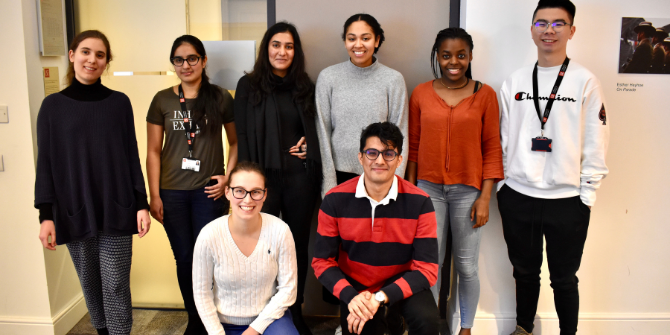In the LSE Volunteer Centre, we get a lot of students asking us how they can get volunteer in the international development sector. Some want to gain relevant experience, some want to change the world and some are simply keen to make a difference. However, it can sometimes be a challenge to find the right role with the right organisation.
Last year, we invited a panel of experts onto campus to discuss how to find a volunteer role in international development and answer your questions. We were joined by Olivia Darby (Director of Policy and Campaigns at the Wonder Foundation), Adrian Gannon (Head of Engagement at Medair UK) and Martin Punaks (International Development Consultant). Read on for some top tips from the discussion and find out what we explored on the day.
Passions vs. Skills
One of the first topics up for conversation was about what applicants should put in their cover letters and forms. As volunteer recruiters and managers, the panel stressed that whilst being passionate about the field is important, where applicants go wrong is not communicating the skills they have to offer the organisation. It was clear that the panel wanted to know how the volunteers were going to benefit their organisation and how they matched the role.
Martin went on to discuss that these skills don’t necessarily have to be from previous international development-related volunteer roles. We all know about transferable skills (if you don’t check out the resources on LSE Careers), but the panel felt that students often forget to mention them when applying the field. Martin recognised that ‘it’s a privilege to have been able to volunteer abroad, earning no money for long periods of time’, and so our experts are always keen to read about transferable skills from experiences outside of the sector. Adrian, Head of Engagement at Medair, elaborated that they want to recruit volunteers with different levels of experience and that part of what they want to do is give the volunteer the experience and training.
“You need to demonstrate the soft skills you have and why are suitable for the role” – Olivia Darby
Choosing the role: ‘It’s all about matchmaking”
The most important takeaway from this part of the discussion was that international development is a huge field that covers a variety of issues from water sanitation to international aid, poverty relief to large-scale health projects. So, it’s vital that you align your skills, passion and experience with the right area in the field. From there, it’s also key to think about whether you want to work in Head Offices in the UK or on the ground overseas, as this will also guide your application. The panel agreed that thinking about all the above considerations will help you find the best ‘match’ for you and you get a lot more from the experience.
Red-flags in international volunteering
Orphanages are one of the biggest red flags when looking at the ethical nature of an international development organisation. Having volunteered in an orphanage in the past and then actively campaigned against orphanage volunteering, Martin expressed his concern about any organisation that promotes this. “It’s an outdated model of care… 80% of children in orphanages are not actually orphans”, he said outlining that many of the children are trafficked into orphanages or [given-up] by primary carers for hope of a better life.
Ask yourself “would I be allowed to do this role in the UK?”, which essentially means do I have the right qualifications. We’ve read horror stories of unqualified volunteers performing medical procedures with no history of being in the health profession, or volunteers building schools with no experience of construction work. Not only does it not make sense for non-qualified volunteers to carry out these tasks but in some cases it can be harmful. One also must be aware that their presence might be putting a local person/company out of business, in turn affecting the local economy.
Time commitment
Our annual charity partner survey always shows how committed LSE student volunteers are and our charity partners really appreciate this. But something we are often asked at the LSE Volunteer Centre is ‘how much time do I have to commit?’. In fact the biggest barrier to LSE students volunteering is ‘not having enough time’, according to our annual student survey.
Of course, time commitment varies between organisations and volunteer roles but our panel all acknowledged LSE students face pressures on their time. Most placements were 1-2 days a week for a minimum of 3 months, but over the summer they often provide intense fulltime placements over a shorter time period. For Olivia, who works for a smaller charity, it’s easier for the roles to be more flexible and accommodate the volunteer’s timetable. However, she stressed that there’s no point in volunteering unless you are committed. Don’t ask if there is something you can do that is low commitment as it shows a lack of understanding in the value and responsibility of your role.
As the discussion drew to a close, our experts were keen to remind the audience to reflect on their volunteering experiences, both during and after they end. Olivia shared her practise of exit interviews with any volunteers she recruits, to give them the space to think about their own personal development and to acknowledge both soft and hard skills gained during the placement.
Volunteering within the field of international development is a big subject, so we run multiple events to help and advise students. Next term, we’ll be hosting a Discover ID event to further explore volunteering within the international development field so keep you eyes peeled! If you need any further support or advice please book a one-to-one appointment with LSE Volunteer Centre Manager, David Coles.
If we’ve inspired you to volunteer, check out one of our other 200+ ongoing opportunities or book a one-to-one with David Coles, the Volunteer Centre Manager if you have more questions. If you are short on time, then take a look at the one-off opportunities that will return for Michaelmas Term 2019, organised by the LSE Volunteer Centre. And why not follow us on Facebook, Twitter, and Instagram to stay up-to-date with our events and opportunities and read our blog for more volunteering tips and stories.





